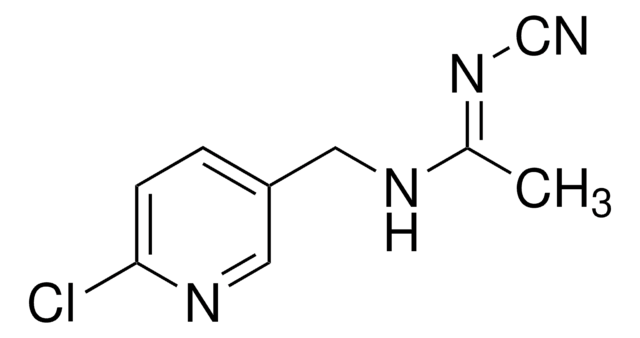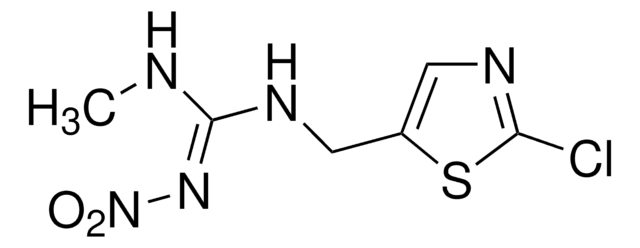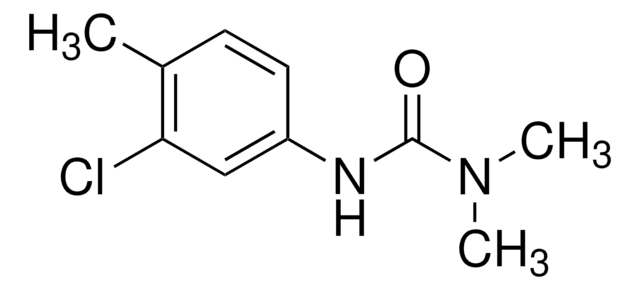33674
N-(6-Chloro-3-pyridylmethyl)-N-cyano-N-methylacetamidine
PESTANAL®, analytical standard
Synonyme(s) :
Acetamiprid, sum of isomers
About This Item
Produits recommandés
Qualité
analytical standard
Niveau de qualité
Description
mixture of isomers
Gamme de produits
PESTANAL®
Durée de conservation
limited shelf life, expiry date on the label
Technique(s)
HPLC: suitable
gas chromatography (GC): suitable
Pf
100-102 °C
Application(s)
agriculture
environmental
Format
neat
Chaîne SMILES
CN(Cc1ccc(Cl)nc1)\C(C)=N\C#N
InChI
1S/C10H11ClN4/c1-8(14-7-12)15(2)6-9-3-4-10(11)13-5-9/h3-5H,6H2,1-2H3/b14-8+
Clé InChI
WCXDHFDTOYPNIE-RIYZIHGNSA-N
Vous recherchez des produits similaires ? Visite Guide de comparaison des produits
Description générale
Application
Informations légales
Mention d'avertissement
Danger
Mentions de danger
Conseils de prudence
Classification des risques
Acute Tox. 3 Oral - Aquatic Acute 1 - Aquatic Chronic 1 - Repr. 2
Code de la classe de stockage
6.1C - Combustible acute toxic Cat.3 / toxic compounds or compounds which causing chronic effects
Classe de danger pour l'eau (WGK)
WGK 3
Point d'éclair (°F)
Not applicable
Point d'éclair (°C)
Not applicable
Équipement de protection individuelle
Eyeshields, Faceshields, Gloves, type P2 (EN 143) respirator cartridges
Faites votre choix parmi les versions les plus récentes :
Déjà en possession de ce produit ?
Retrouvez la documentation relative aux produits que vous avez récemment achetés dans la Bibliothèque de documents.
Les clients ont également consulté
Protocoles
Learn more about Neonicotinoids - active substances used in plant protection products to control harmful insects.
Learn more about Neonicotinoids - active substances used in plant protection products to control harmful insects.
Learn more about Neonicotinoids - active substances used in plant protection products to control harmful insects.
Learn more about Neonicotinoids - active substances used in plant protection products to control harmful insects.
Notre équipe de scientifiques dispose d'une expérience dans tous les secteurs de la recherche, notamment en sciences de la vie, science des matériaux, synthèse chimique, chromatographie, analyse et dans de nombreux autres domaines..
Contacter notre Service technique


















